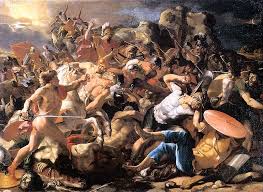David Defeats the Amalekites
First Samuel 30: 9-17
David defeats the Amalekites DIG: Knowing that the Israelites lived in Ziklag, how would you have felt being interrogated by David if you were the Egyptian? Did David give him water and food before or after the Egyptian agreed to help the Jews find the Amalekites? What does that say about David? While the Amalekites were destroying Ziklag, Sha’ul was dying at the hand of the Philistines. How did David at that point replace Sha’ul as the LORD’s anointed (see First Samuel 15:2-3)?
REFLECT: What problems are you facing right now that you have totally relied on the LORD to solve? You have no idea how to find the answer. Are you paralyzed by fear, are you too exhausted? Or do you strike out in faith? Why? How? When? Who, like the Egyptian slave, has God put in your path to help you find the solutions to your problems? What victories have you had in your life that you can look back on, knowing that the LORD was with you? How can you help others with that knowledge?
The Pursuit: There was no way of telling where the raiding Amalekites had gone, since they were a nomadic people (to see link click Ca – David Inquired of the LORD). So YHVH told David to go forward as best he could, in the same way that God will often call believers today to obey Him without a clear end in sight.206 David and the six hundred men with him left Ziklag and came to the Besor Valley where some stayed behind. After traveling another twelve miles or so, two hundred of them were too exhausted to cross the brook Besor into the Negev, not surprising considering they had just covered eighty miles or so from Aphek to Ziklag in the previous three days. But David and the other four hundred continued the pursuit (First Samuel 30:9-10). David had entered into the grief of his people and then moved beyond the grief into faithful, saving action.207
The Egyptian Slave: Providentially, God provided a blessing in the form of an Egyptian servant who had been abandoned by his Amalekite master. They found an Egyptian in the field and brought him to David. They gave him water to drink and food to eat – part of a cake of pressed figs and two cakes of raisins. He ate and was revived, for he had not eaten any food or drunk any water for three days and three nights. David asked him, “Who do you belong to? Where do you come from?” He said: I am an Egyptian (and would not fall under the judgment of annihilation), the slave of an Amalekite. My master abandoned me when I became ill three days ago. A sick slave was not worth the cost of being taken care of, especially because the Amalekites just captured a whole town that they could use as slaves. We raided the Negev of the Kerethites (who will later become part of David’s army), some territory belonging to Judah that had been taken over by the Philistines and the Negev of Caleb. And we burned Ziklag.” David asked him, “Can you lead me down to this raiding party?” Although the Egyptian had been abandoned by the Amalekites three days previously, he would still know better than David their hideouts and objectives. He answered: Swear to me before God that you will not kill me or hand me over to my master, and I will take you down to them (First Samuel 30:11-15).

The Attack on the Amalekites: It was obvious that David could have never found his enemies if ADONAI had not provided the Egyptian servant to lead him. He led David down, and there they were, scattered over the countryside. In their excessive self-indulgence, the Amalekites were eating, drinking and dancing because of the great amount of plunder they had taken from the land of the Philistines and from Y’hudah. David caught them by surprise, as the Amalekites were probably be still asleep, hung over and unable to defend themselves. David fought them from dusk until the evening of the next day. The attack was massive, bloody, and decisive. None of them got away, except for four hundred young men who rode off on camels and fled (First Samuel 30:16-17). At that point all the honor belonged to David, just as earlier he had been obliged to take all the blame.



Leave A Comment